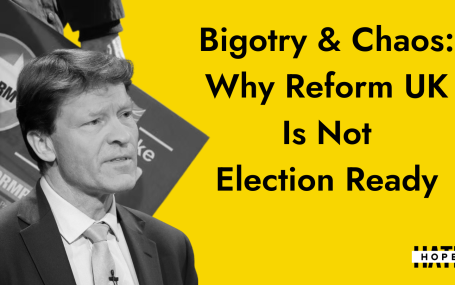HOPE not hate uses cookies to collect information and give you a more personalised experience on our site. You can find more information in our privacy policy. To agree to this, please click accept.
Like other right-wing populist and extreme right parties, the AfD regularly complains about the media – either as being ignored or as being treated unfairly….
Like other right-wing populist and extreme right parties, the AfD regularly complains about the media – either as being ignored or as being treated unfairly. In fact, the AfD receives a huge amount of media attention and its leading representatives are invited quite often onto political talk shows.
Also, media coverage has been extensive, contributing heavily to the AfD’s high visibility. Since late 2015, more and more public broadcasters decided to not label the party as right-wing populist when putting it on a political scale. This decision was greeted by the AfD as a step in recognising it as a democratic party.
Nevertheless, leading AfD representatives still contribute to the idea that the majority of media are systematically misleading the population, e.g. by not covering “the real threat” coming from Islam or from “sexually aggressive migrants”.

While not repeating the term “lying press” – so popular amongst right-wingers in Germany in the mid-2010s – Frauke Petry has tried assiduously to popularise the term “Pinocchio media”. Yet, as research by young reporters has shown, in 2016 nearly 30 % of the “factual” statements she made as a talk show guest were completely or largely wrong.
The main attack of the AfD is against public broadcasting with a campaign against the obligatory radio licence fee which, demands the AfD, should be abolished.
The demand is presented by the neoliberal wing of the party that wants to weaken public broadcasting generally in favour of privately-owned TV companies but, at the same time, it is supported by the right-wing that makes public broadcasting responsible for not following a nativist, pro-life, and conservative programme.
While the party makes extensive use of the slogan “Courage for the truth”, it has denied journalists entry to party meetings several times. More radical statements can also be found in the party. Writing to an internal WhatsApp-Group of the AfD in Saxony-Anhalt, a police officer demanded that all media hostile to the German people should be banned after the “takeover of power”.
Media are not new to the AfD. Several well-known journalists have joined the party, among them Alexander Gauland who was the editor of the Maerkische Allgemeine Zeitung with a circulation of some 175,000 in Brandenburg from 1991 to 2005.
He now leads the AfD parliamentary group in Brandenburg. Leif-Erik Holm was a famous radio reporter in Mecklenburg–West Pomerania before running for the AfD. In Lower Saxony, at the top of the party branch sits Armin Paul Hampel, a former journalist with the public broadcasting agency. Nicolaus Fest was formerly deputy editor-in-chief of the Sunday edition of the tabloid daily BILD which has readership of ten million people.
They know how the media works and how to exploit media logic. In a strategic plan, leaked in 2017, the AfD outlined its ideas to make headlines. A major point was to create carefully calculated scandals that would prompt the media to cover the AfD.
Already now, the AfD can rely on several outlets that strongly support its case. The weekly Junge Freiheit has supported the party from the very start. Although in the beginning clearly taking sides with Bernd Lucke, it was still with the radicalised party when it proved that its development further to the right did not lead to a loss of voters. The monthly journal Zuerst! supports the more radical elements in the AfD with at least two interviews in every edition.
Finally, it is Compact magazine – edited by one-time left-winger and anti-fascist Jürgen Elsässer – that offers the most aggressive and disgusting attacks on the Merkel government, the political left and human rights NGOs. Once in support of Frauke Petry, whom the editor deemed to be “the better Chancellor,” the magazine has turned to supporting Gauland. Several blogs also support the party.
In summer 2017, a new far right tabloid weekly was started under the name Deutschland-Kurier. It offers a worldview close to that of the AfD. Contributors include Erika Steinbach who recently left the Christian Democratic Party and former editor-in-chief of the tabloid BILD Peter Bartels.

HOPE not hate reveals ANOTHER shameful Reform UK candidate – and lifts the lid on the party’s chaotic selection process UPDATE: Reform UK has DROPPED…